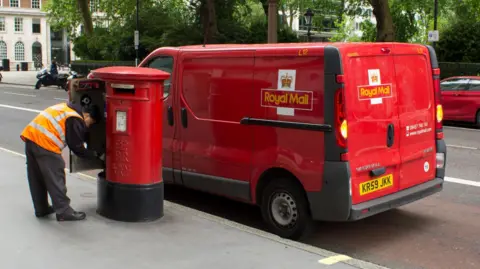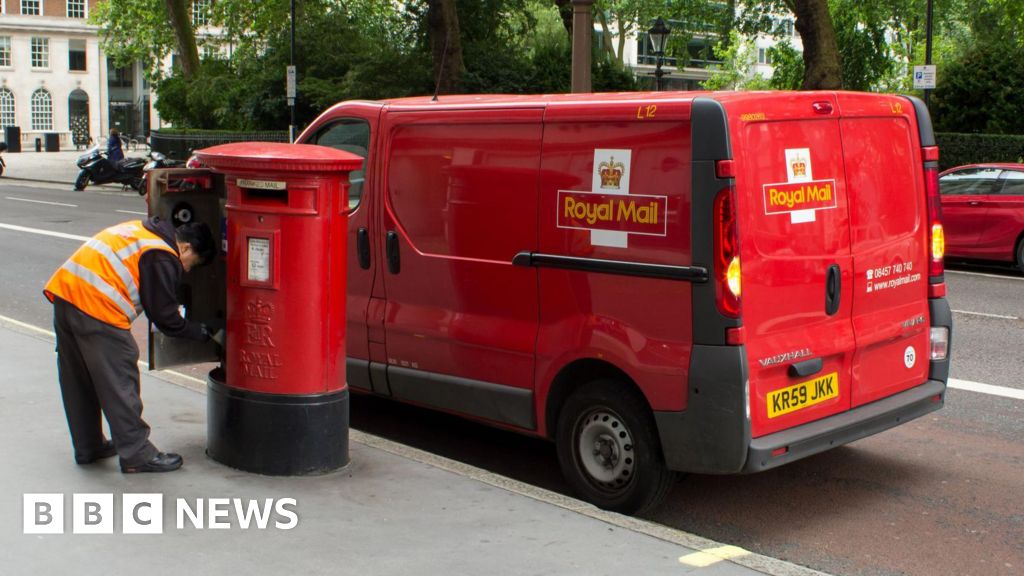Business reporter
 Getty Images
Getty ImagesRoyal Mail will start to deliver second-class letters on every other weekday and not on Saturdays to help cut costs, the industry regulator has said.
Ofcom said a reform to postal service was needed as people are sending fewer letters each year, so stamp prices keep rising as the cost of delivering letters goes up.
The changes mean second-class letters will be delivered either on Monday, Wednesday and Friday, or on Tuesday and Thursday, in a two-week cycle.
Royal Mail welcomed the changes, which will take effect on 28 July, but the move was criticised by MPs and consumer groups.
Under the current one-price-goes-anywhere Universal Service Obligation (USO), Royal Mail has to deliver post six days a week, from Monday to Saturday, and parcels on five from Monday to Friday.
Ofcom says Royal Mail will have to continue to deliver first-class letters six days a week.
“These changes are in the best interests of consumers and businesses, as urgent reform of the postal service is necessary to give it the best chance of survival,” said Natalie Black, Ofcom’s group director for networks and communications.
However, just changing Royal Mail’s obligations will not improve the service, she said.
“The company now has to play its part and implement this effectively.”
Royal Mail estimates it will take 12 to 18 months to implement the changes across its network.
It has been piloting the changes to delivery since February in 37 of its 1,200 delivery offices, and said it was “keen to move ahead with deployment as soon as possible”.
The regulator is also making changes to Royal Mail’s delivery targets.
The company will have to deliver 90% of first-class mail next-day, down from the current target of 93%, while 95% of second-class mail must be delivered within three days, a cut from the current 98.5%.
However, there will be a new target of 99% of mail being delivered no more than two days late to incentivise Royal Mail to cut down on long delays.
Royal Mail’s parent company, International Distribution Services (IDS), welcomed the Ofcom announcement, saying it was “good news for customers across the UK”, and that it would support a “reliable, efficient and financially sustainable Universal Service”.
Martin Seidenberg, IDS chief executive, said the changes follow “extensive consultation with thousands of people and businesses” to reflect their needs and the “realities of how customers send and receive mail today”.
However, consumer group Citizens Advice said Royal Mail had a “woeful track record of failing to meet delivery targets, all the while ramping up postage costs”.
Tom MacInnes, Citizens Advice director of policy, said Ofcom had “missed a major opportunity to bring about meaningful change”.
“Pushing ahead with plans to slash services and relax delivery targets in the name of savings won’t automatically make letter deliveries more reliable or improve standards,” he said
The regulator needs to force Royal Mail to give “paying customers a service that delivers,” he added.
The Liberal Democrats also criticised the changes, saying it was a “deeply worrying decision that could leave countless people who rely on these deliveries in the lurch”.
Its business spokesperson Sarah Olney said: “People need to know that their post will arrive on time so they can go about their lives, and this move flies right in the face of that.”
Ofcom “needs to step in and act by holding this failing service fully accountable”, she added.
The UK Greeting Card Association said “a Royal Mail that isn’t delivering, is a Royal Mail that will hold back Britain”.
Its chief executive Amanda Fergusson said: “Our members remain concerned that a reduction in the second-class service, would lead to a reliance on uncapped, unregulated first-class mail that is increasingly unaffordable for businesses and consumers alike.”
The number of letters Royal Mail delivers has fallen from a peak of 20 billion in 2004-05 to 6.6 billion in 2023-24.
However, the price of stamps has continued to rise. Since 2022, Royal Mail has hiked the cost of a first-class stamp from 85p to £1.70.
Despite pushing up prices, in 2023-24, Royal Mail made a loss of £348m.


